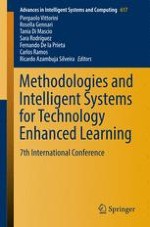2017 | OriginalPaper | Buchkapitel
Assessing the Role of Computer Simulation in Chemistry Learning
verfasst von : Margarida Figueiredo, Catarina Rafael, José Neves, Henrique Vicente
Erschienen in: Methodologies and Intelligent Systems for Technology Enhanced Learning
Aktivieren Sie unsere intelligente Suche, um passende Fachinhalte oder Patente zu finden.
Wählen Sie Textabschnitte aus um mit Künstlicher Intelligenz passenden Patente zu finden. powered by
Markieren Sie Textabschnitte, um KI-gestützt weitere passende Inhalte zu finden. powered by
